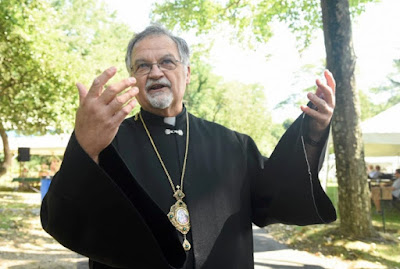Down Under, The Reckoning – Pope's CFO To Stand Trial for Abuse
Capping a two-month preliminary hearing to weigh the evidence against Cardinal George Pell, a judge in Melbourne ruled early Wednesday that the first-ever Vatican CFO – likewise a member of Pope Francis' "Gang of Nine" lead advisers – would be tried on "multiple historical sexual offenses," with courtroom reports relaying that half the original charges had been dismissed on grounds of lacking witnesses or other corroboration.
Ten months since the 76 year-old's historic indictment after an investigation by police in his native state of Victoria, the number and specifics of the surviving counts remain sketchy, the entire slate having been laid out in earlier proceedings closed to the press and public. According to the state broadcaster ABC, however, at least one charge dates to Pell's time as archbishop of Melbourne in the 1990s.
An Oxford-trained historian with a devoted following among the church's conservative wing, Pell was transferred from Australian Catholicism's largest diocese to its marquee post – the archbishopric of Sydney – in 2001, made a cardinal in 2003 and brought to Rome in 2014 by Francis, who entrusted the battle-ready Aussie with a sweeping mandate to clean up the Vatican's long-troubled, multi-pronged financial behemoth and consolidate it under his control.
In that light, as Pell has been on a self-described "leave" as Prefect for the Economy to fight the charges since their announcement late last June, yet still officially holds the title – and his deputy at the new Secretariat, Msgr Alfred Xuereb, was subsequently promoted as Archbishop-Nuncio to South Korea without being replaced – the fate of what's arguably the most significant plank of the Pope's attempt at internal reform has been thrown into doubt. (And, indeed, it could be said that's just how the natives want it.)
As previously reported, the cardinal is not expected to return to the Roman post following the trial, regardless of its outcome. Pell turns 77 in June, and – at least, under current circumstances – will remain Australia's lone papal elector until his 80th birthday.
While Pell's ideological fan-base has sought to portray the scrutiny of the cardinal as a "persecution" driven by revenge for his china-busting interventions on social issues, even his most bitter critics at home have viewed the likelihood of a conviction as far-fetched. In any case, the court process has taken place against a uniquely brutal double backdrop: Pell's history as perhaps the most polarizing figure in Australian life over the last two decades, compounded by the damning fallout of a five-year national probe of sex-abuse in churches and schools, which saw the cardinal's successor in Sydney admit the church's "criminal negligence," and whose sprawling final report in December (after interviews with some 8,000 survivors) called for changes to the church's hiring and consultation practices as well as a revision to canon law that would remove the pontifical secret from internal investigations and tribunals.
Escorted into the courthouse this morning by police given the usual scrum of protestors and media outside, Pell pled not guilty to the remaining charges. Per wire reports, some spectators in the courtroom broke into applause as the hearing ended.
The date for the cardinal's trial has not been set.
The Australian ruling is but one piece of the impending news-cycle which will plunge the wider church afresh into the scandals and their enduring toll. On one front, having spent last weekend with three prominent Chilean victim-survivors to apologize and hear their stories and recommendations, the Pope will lead an extraordinary summit with all the country's bishops in mid-May after his initial response to the most prominent abuse case there caused a global debacle. In the US, meanwhile, a statewide grand jury probing six of Pennsylvania's eight Latin-church dioceses is expected to publish its final report within the coming weeks, its contents already tipped to be blistering by survivor advocates and church officials alike.
Chartered after a 2016 grand jury on the diocese of Altoona-Johnstown saw three Franciscan provincials charged, decades of cover-ups detailed and the attorney general's office "flooded" with fresh allegations, the statewide panel's mandate is set to expire this spring following two years of testimony, underpinned by the subpoena of personnel files dating back to 1947 from the Chanceries of Allentown, Erie, Greensburg, Harrisburg, Pittsburgh and Scranton – a group whose respective handling of cases has conspicuously varied through the years.
-30-








